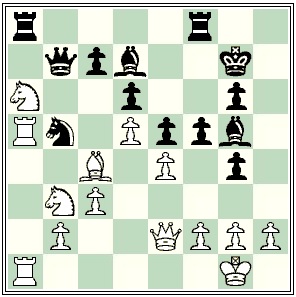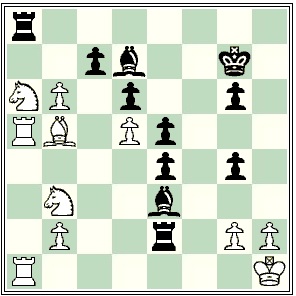In the comments to Walsh-Botvinnik, Martin Crichton mentions a game between Kiernan (presumably Bernard Kernan) and Karpov, when the latter was World Champion. I’m sceptical that such a game exists (I couldn’t find it in any of the normal databases or a half-dozen or so Karpov books) and think Martin might be mixing it up with a game played by another very gifted (and slightly older) Irish player.
I can still remember 39 years ago buying “The Best of Karpov” by Peter Markland (Oxford University Press, 1975) in a Belfast bookshop. A little sticker “Karpov World Champion” had been added to the cover in a cunning ploy to maximise sales. This was a collection of 75 Karpov games, up to his 1974 Candidates final victory over Viktor Korchnoi. Karpov inherited the world title the following year on Fischer’s “abdication”. By a nice coincidence Game 2 in the Markland collection featured a Belfast man, John Moles, and the course of the game bears a similarity to Martin’s description of the “Kernan game.”
The book Martin refers to as Karpov’s “My 500 Best Games” may well be “Karpov’s Collected Games” by David Levy (Robert Hale, 1975). Subtitled “All 530 Available Encounters”, it was clearly a rival to the Markland book and it ended at exactly the same point in chess history. Karpov had a direct involvement in this book too, by making available all his game scores. He also helped choose which of the 530 games should be annotated, some of those by Karpov himself. Fortunately for our understanding of the Moles game, it has the World Champion’s own annotations.
Karpov had chosen the 75 games for inclusion in “The Best of Karpov” but Markland had annotated them. Markland’s introduction to the game had stated:
“This game shows how relentless pursuit of a straightforward and simple plan can produce a win. The white strategy of bombarding the weakened a-pawn cannot satisfactorily be met and although Black appears to have some counterplay this is merely an illusion.”
All 75 games are deeply annotated by Markland and this was not some quick to publication effort to take advantage of Karpov’s status. At the time, I had no reason to doubt Markland’s take on the game. However when I played over the game again all these years later with the benefit of Karpov’s annotations and an engine running in the background, there was a surprising twist in the tale.
Anatoly Karpov-John Moles
European Under 20 Championship 1967-8, Groningen
Final-Group A (Round 2), 3rd January 1968
[Click to play through the full game]
1.e4 e5 2.Nf3 Nc6 3.Bb5 a6 4.Ba4 Nf6 5.Qe2 Be7 6.c3 b5 7.Bb3 d6 8.a4 Bb7 9.0-0 0-0 10.d3 h6 11.Re1 Nh7 12.d4 Ng5 13.Bxg5 hxg5 14.d5 Na7 15.Rd1 g4 16.Ne1 Bc8 17.axb5 Nxb5 18.Bc4 Bd7 19.Nc2 Qc8 20.Nd2 g6 21.Nb4 Bg5 22.Ra5 Qb7 23.Nb3 Kg7 24.Rda1 f5 25.Nxa6 (Diagram 1)
“White wins a pawn and completely occupies the Q-side. It seems that Black has failed to create any counter chances, but that is only an illusion. Now the game becomes unexpectedly sharp” – Karpov.
25…Qb6
“Black’s only chance. He sacrifices a piece and gets an ominous attack due to the fact that White’s pieces are tied down” – Karpov.
26.Bxb5 fxe4 27.c4
Markland gives this an exclamation mark. Karpov remarks that this is best and provides an analysis of an alternative variation: 27.Bxd7 Rxf2 28.Qxf2 Be3 29.Qxe3 Qxe3+ 30.Kh1 Rh8 31.Bxg4 Qg3 32.Bh3 Rxh3 33.gxh3 Qf3+ 34.Kg1 Qe3+ 35.Kf1 Qf3+ and draws. If 36.Ke1 e3!
27…Rxf2 28.c5
“Black’s attack is over and best here would be to resign” – Markland. However, this may not be at all correct and possibly Karpov should even has chosen his alternative at move 27.
28…Rxe2 29.cxb6 Be3+
“Now I had to think again” – Karpov.
30.Kh1 (Diagram 2)
Karpov was concerned about being mated playing this move but considered “Black has an excellent position” after the alternative 30.Kf1 Rf2+ 31.Ke1 cxb6 (in fact it’s even worse than that; the engine gives 31…Bxb5 and mate in 8)
30…Bxb5
The modern engine again sees more: Karpov had considered the possibility of a mating attack starting with 30…Rh8 and he was going to rely on 31.Bxd7, but after 31…Bf4 32.h3 Rxh3+ 33.gxh3 g3 (Precise move order is important here; Karpov had only considered 33…Rh2+ 34.Kg1 g3 35.Re1 winning for White) 34.Kg1 (the threat was Be3 and Rh2 mate) 34…g2 35.h4 Be3+ 36.Kh2 g1Q+ and Black mates next move.
If Black had gone 30…Rh8 White needed to play 31.Bxe2 when, as Karpov had foreseen, 31…g3 32.h3 Bxh3 33.gxh3 Rxh3+ 34.Kg2 Rh2+ 35.Kxg3 Bf4+ 36.Kg4 Rg2+ 37.Kh3 Rh2+ 38.Kg4 is a perpetual check.
31.b7 Rh8 32.b8Q Rxb8 33.Nxb8
Karpov simply remarks: “White is a rook ahead.” However it appears that things are still not that simple.
33…Bc4 34.R5a3
Probably an error. The engine prefers 34.Na6 assessing it at about -0.5.
34…Rxb2
It would seem that only here did Moles go wrong. If instead 34…Bxd5 White will still have great difficulty unravelling his pieces. Analysing this position is above my pay grade but the engine is confident that White is at least -2.0.
35.Na5 Rxb8 36.Nxc4 Bd4 37.Rd1 Rb4
Here’s another little surprise. We are following the game score as given in the two books. However many modern websites and databases (e.g. the ICU) give the end of the game as 37…Rb3 (which would give away a Rook) 38.Ne3 Rb5 39.g3 Rc5 40.Kg2 Rb5 41.Rc1. A hat tip to the Kibitzers at Chessgames.com.
38.Ne3 Rb5 39.g3 Rc5 40.Kg2 Rb5 41.Rc1 1-0
This game must have meant something to Karpov for him to select it twice for particular attention. Maybe it provided one of the building bricks towards a greater understanding of chess on the way to becoming World Champion.



Yes
SeanDavidgood correction…Moles not Kernan…having played through the game the piece for 2 pawns confirms it was indeed Moles I was thinking of. However the book I was referring to was definately Karpovs 500 best games… (not his best 75 games) I would have purchased my copy around 1979!
Regards
Thanks Martin—though I’ve taken the liberty of editing your comment, as the post was written by David McAlister. (I would have liked to be able to claim credit for it, as I’ve never seen a win for Moles pointed out in this game.)
Incidentally, we have now passed the 200 post milestone n IRLchess: 176 by myself and now 25 by David.
Pingback: Karpov-Moles revisited | IRLchess